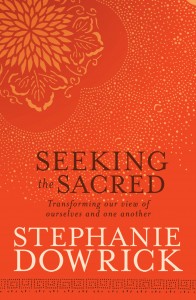This is a deeply timely talk from Dr Stephanie Dowrick at a moment when violence and injustice seem to dominate the headlines. How do we stay in touch with our own peacemaking efforts, our will towards kindness? She starts with an ancient prayer from the Bhagavata Purana that resonates for all: “May the world be at peace. May those with restless minds be serene. May all learn to think about and care for others. May their minds [may our minds] be engaged with what is uplifting. May our hearts be filled with selfless love.”

(And later): The key impulse here is, surely, learning: learning from our mistakes so that we don’t repeat them… and also learning and learning again from what goes well, from what heals, what lifts spirits, what effectively lights actual or metaphorical candles in the darkness, what restores hope, trust, delight, compassion, consolation, and joy. This is not, I think, best discovered through dogma, “belief” or instructions from others: it is learned through daily, personal experience…through open-minded, committed reflection on those experiences – and through your open-heartedness, humility and courage. Again – as we have so often shared in this and other places: it is learned through seeing with clear eyes what works and what does not; what lifts spirits and what lowers them: what harms and what benefits; what adds to the world’s joy and what takes joy away.
How should we do this?
With our feet firmly on the ground, connected to the earth: connected to daily life, and daily living. Bringing the sacred into the everyday. Making every day SACRED, making every day count: a ground of learning, of being, of becoming who and what we truly are.

This wakes up the qualities of soul, of eternal self, of what we could call an ENLIGHTENED mind – a mind where light can shine even on its own darkness fearlessly And the glorious news is that this is not something that only special or rare people have: we all have this divine spark: this tikkun olam as our Jewish brothers and sisters call it…this potential to heal the world. We all have our part to play; no one else can do this for us.
The key impulse here is, surely, learning: learning from our mistakes so that we don’t repeat them… and also learning and learning again from what goes well, from what heals, what lifts spirits, what effectively lights actual or metaphorical candles in the darkness, what restores hope, trust, delight, compassion, consolation, and joy.
…
The glorious news is that this is not something that only special or rare people have: we all have this divine spark: this tikkun olam as our Jewish brothers and sisters call it…this potential to heal the world. We all have our part to play; no one else can do this for us.
And how lovely to know that we discover this in the most truthful way possible: by lifting our gaze to see that what brings us happiness also brings others happiness; that what we experience as kind, others will also; that what makes us safe, makes others safe.
Doing this – following the ancient Golden Rule and bringing it to the forefront of our lives – we will inevitably grow in compassion NOT BECAUSE SOMEONE ELSE HAS TOLD US TO DO THIS…but because we CAN.
And this has to be one the sweetest and truest insights of spiritual life: that each and every one of us – regardless of gender, race, our conditioned culture or religion – each one of us is FREE to bring the light of inspiration and kindness to the world, even and especially in the midst of darkness.
And this is what will heal our world: that we are free to treat one another well; that we are free to regard life as sacred; that we are free to bring happiness and healing to others and, in so doing, bring happiness and healing also to ourselves.
(Please refer to Stephanie Dowrick’s Seeking the Sacred for more thoughts on this vital topic of personal and shared enlightened peacemaking. You can also visit Stephanie Dowrick’s FACEBOOK page to leave comments. Or please use our generous array of social media buttons below to share this video with those in your own circles, to pin or email it.)

